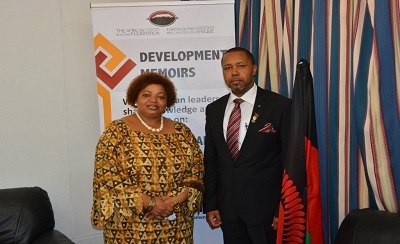
“Inadequate capacities in areas of human resources, investment, and infrastructure are the major reasons for Africa’s current development status in the Information, Communication and Technology (ICT) as well as telecommunications sector,” said the Vice President of the Republic of Malawi, Rt. Honourable Dr. Saulos Chilima at an interview with the African Capacity Building Foundation (ACBF) on 23 March 2016 in Lilongwe, Malawi.
Rt. Hon. Dr. Chilima spoke on the role of ICT in the sustainable and inclusive development of Africa largely focusing on understanding the capacity challenges. The interview was part of the Foundation's Development Memoirs Program. The program documents the know-how and experiences from eminent African leaders and development practitioners.
According to the Vice President, his vision for the African youth who look to him as a model, being a vice president at 43 years, is to embrace skills for modern knowledge economies where ICT plays a key role.
The Rt. Hon Dr Chilima called for African states and donors to invest in and support work on capacity building by pan-African institutions, such as ACBF, if the continent has to develop sustainably and inclusively.
The Development Memoirs Program is one of the key instruments in the Foundation’s knowledge management toolkit. The Programme provides a platform by which successful development practitioners (serving or on retirement, sabbatical, and leave of absence) who have made significant contributions to the development process in Africa or other developing regions, and are willing to document and share their memoirs — are targeted for extracting tacit knowledge for the benefit of future efforts at African development.
The programme targets very senior policymakers and development managers, including visiting academics and eminent guests to the Foundation. Participating policymakers and development managers are selectively drawn from the public and private sectors; national, regional and continental institutions; international development agencies; civil society organizations; ACBF partner institutions; tertiary institutions of learning; research and specialized training institutes, among others.
The development memoir series featuring the Malawi Vice President, Rt. Hon Dr Chilima will be published by ACBF mid this year.
Click here to read the ACBF Development Memoirs Series.





